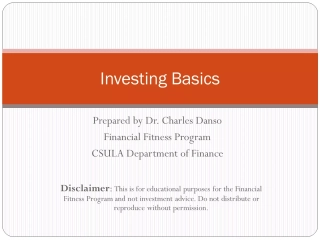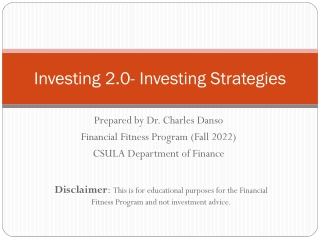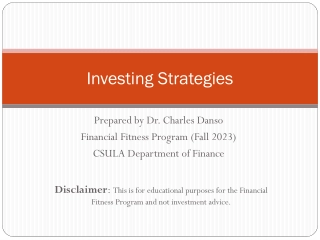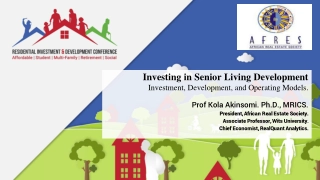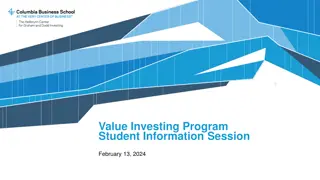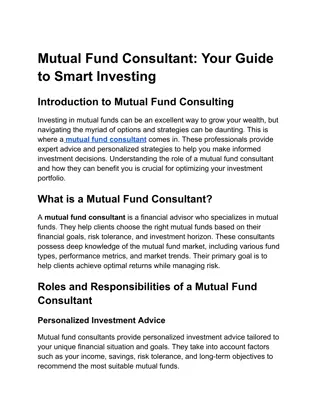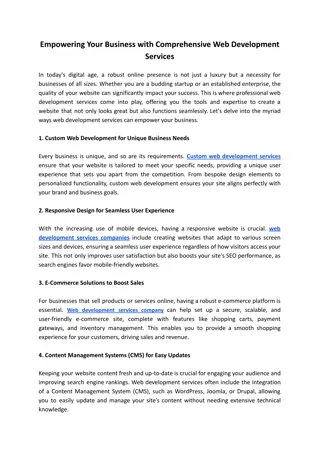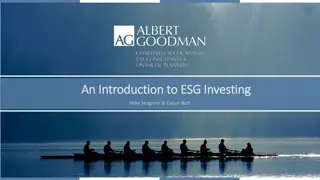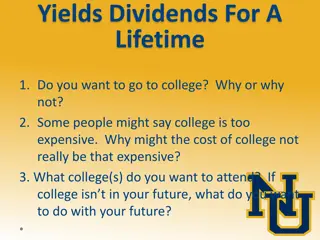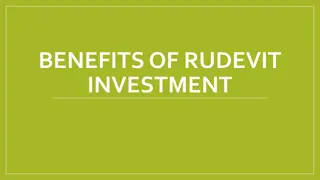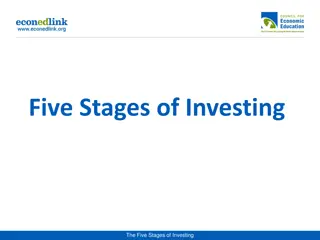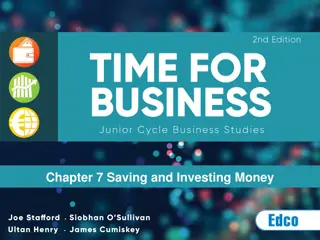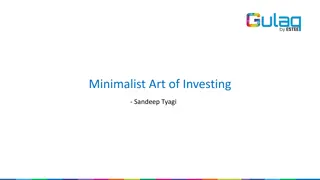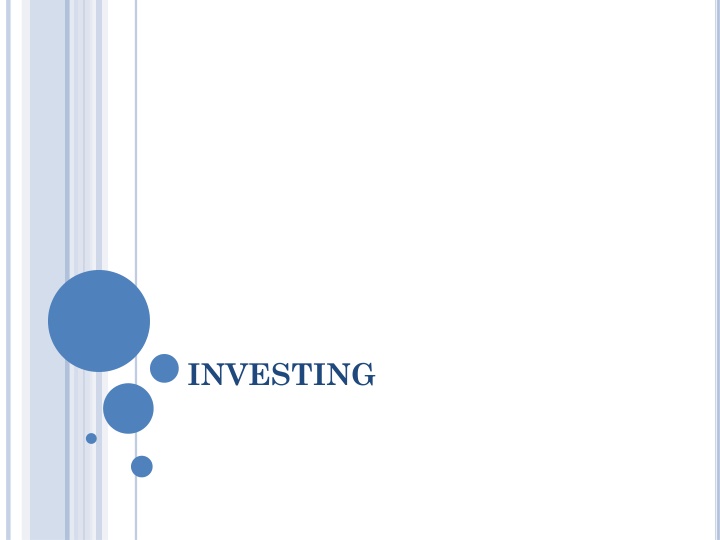
Essential Tips for Deciding to Invest and Types of Investments
Learn important considerations before investing, reasons people invest, investment characteristics, types of investments like securities and stocks, and the Truth in Lending Act for better understanding of financial investments. Make informed decisions to grow your wealth wisely.
Download Presentation

Please find below an Image/Link to download the presentation.
The content on the website is provided AS IS for your information and personal use only. It may not be sold, licensed, or shared on other websites without obtaining consent from the author. If you encounter any issues during the download, it is possible that the publisher has removed the file from their server.
You are allowed to download the files provided on this website for personal or commercial use, subject to the condition that they are used lawfully. All files are the property of their respective owners.
The content on the website is provided AS IS for your information and personal use only. It may not be sold, licensed, or shared on other websites without obtaining consent from the author.
E N D
Presentation Transcript
DECIDING TO INVEST Before investing, make sure: You are living within your means You are not paying finance charges or credit card debt- charges and interest will be higher than any earnings on investments You have adequate insurance protection You have emergency savings of 6-12 months of living expenses. continued
DECIDINGTO INVEST Investing is purchasing a financial product or valuable item with the goal of increasing wealth over time Investments offer greater returns than savings You risk losing some or all of your investment, but gains usually exceed losses over time continued
DECIDINGTO INVEST Reasons people invest: To increase wealth through appreciation To earn a steady income To beat inflation To take advantage of tax benefits; capital gain is income earned when the selling price is greater than purchase price To preserve wealth in unstable economic times continued
DECIDINGTO INVEST Investment characteristics: Degree of volatility Potential rate of return Level of risk Liquidity Risk tolerance is the amount of uncertainty you can handle
TYPESOF INVESTMENTS Security a type of investment issued by a corporation, government, or other organization Securities include stocks bonds mutual funds
TRUTH IN LENDING ACT The Act that requires financial institutions to provide information about costs and interest- earning accounts in uniform terms Provides Safeguards for the consumer so they understand the terms of their loans/investments
STOCKS Corporations sell stock to pay costs of start-up, continuing operations, and expansion Stock is a share of ownership in a company continued
STOCKS Stockholders have equity in a company share in profits after debts, taxes, and operating expenses are paid aren t responsible for company debt if company fails, but can lose their investment continued
STOCKS Stockholders make money in several ways: Dividend income- The profit payout per quarter made by the company to the shareholders Capital Gain- Profit from the sale of assets such as stocks, bonds, or real estate The money made from successful sale of stocks due to increased stock value Stock splits
STOCK CLASSIFICATIONS Common stock Stockholders can vote in election of company directors and other matters Increases in value more than preferred Preferred stock Less risk; stockholders have first claim on assets if company fails No voting privileges continued
STOCK CLASSIFICATIONS Blue-chip Income Growth Defensive Cyclical Penny
STOCK TRADING Stocks are bought and sold by stockbrokers in a securities exchange or stock market Stockbrokers charge commissions on buy and sell transactions STOCK EXCHANGE Place where most stocks are bought and sold. Major exchanges: NASDAQ New York Stock Exchange Euronext New York Stock Exchange
OVER-THE-COUNTER MARKETS Stocks not listed on securities exchanges can be bought and sold at over-the-counter (OTC) markets An electronic network allows dealers and brokers to conduct business lacks regulations of securities exchanges presents more risk for investors
INITIAL PUBLIC OFFERING An initial public offering (IPO) is a company s first sale of stock to the public to raise capital for expansion become publicly traded Investment banks charge a commission to sell securities to investors; rest of money goes to the company Can be risky investments This happened for Facebook in 2012 when they became publicly traded http://www.ask.com/wiki/Initial_public_offering_of_Facebook?o=2800&qsrc=999&ad= doubleDown&an=apn&ap=ask.com
STOCK QUOTATIONS Stock quotations appear in major newspapers and financial Web sites To find a particular stock, you need the ticker symbol, or company abbreviation Current yield and price/earnings (PE) ratio help investors determine health or weakness of a company continued
BONDS When you buy bonds, you lend money to the issuer a corporation or government Issuer owes you the amount of the loan plus interest on the bond s face value continued
BONDS Information stated on bonds includes maturity date face value yield coupon rate market value current yield
TYPESOF BONDS Corporate bonds are issued when businesses need money to operate and expand Municipal bonds are issued by state, county, and city governments continued
TYPESOF BONDS U.S. Government bonds are issued by the U.S. Treasury Safest bonds you can buy Treasury bills (T-bills) Treasury notes and Treasury bonds U.S. savings bonds
MUTUAL FUNDS Inexperienced investors often start with mutual funds made up of securities chosen by professional managers at investment firms Mutual funds are a collection of investments such as stocks and bonds. continued
MUTUAL FUNDS Advantages: Professional management Diversification If one investment in the fund does poorly, it will be offset by the growth of another investment Liquidity Disadvantages: Management fees Lack of control Minimum investment required
TYPESOF MUTUAL FUNDS Closed-end funds Offer a fixed number of shares Shares are traded like stocks on securities exchanges Shares are bought and sold through investment brokers, not through an investment company continued
TYPESOF MUTUAL FUNDS Most mutual funds are open-end funds Unlimited number of shares Shares are sold and redeemed at their net asset value (NAV) Value per share is the NAV of the fund divided by number of shares outstanding continued
TYPESOF MUTUAL FUNDS Load funds charge a commission on amount invested when shares are bought No-load funds don t charge fees when shares are bought, but may charge fees when shares are sold or redeemed continued
TYPESOF MUTUAL FUNDS Income funds Balanced funds Growth funds Specialized funds Money market funds continued
THE NEWEST INVESTMENT TOOL- EXCHANGE TRADED FUNDS (ETFS) Exchange Traded Funds (ETFs) Mutual Fund that trades like a stock Usually they track an index or a sector of the economy Upsides Instant liquidity- can be bought and sold throughout the day ETFs pay less in capital gains- tax efficiency Typically lower Expense Ratios Downsides Can make it tempting to time the market Bought and sold through brokerage firms- commission costs
FACTORS AFFECTING RETURNS Laws of supply and demand determine the price of stocks and other investments continued
FACTORS AFFECTING RETURNS Factors affecting returns include business cycle fluctuations interest rate fluctuations stock market fluctuations (bull market or bear market) product innovation government actions exchange-rate risk
BULLVS. BEAR Bull Markets Good Markets High Returns Prices Rising (Remember the Bull Stands HIGH when he charges) Bear Markets Poor Markets Low Returns Decline in Prices (Remember the Bear crouches LOW when he runs/charges)
REAL ESTATE Buying real estate (land or buildings) is another way to invest for future profit Usually requires a down payment and a long- term loan Property usually increases in value over time
HOME OWNERSHIP For many people, a home is a place to live the first experience in buying property Advantage- Owning a home can increase net worth and protect against inflation Downfall- Risky because it is NOT a liquid investment. In order to make money someone must BUY your home Also home values have been falling due to a bad economy (like the past few years)
REITSAND REAL ESTATE MUTUAL FUNDS Indirect investments in real estate include Real Estate Investment Trust (REIT) Real estate mutual funds They avoid the complications and financial commitment of owning individual properties
VALUABLE GOODS Collectibles rare coins, books, stamps, art, antiques, sports memorabilia, vintage automobiles Precious metals gold, silver, platinum Precious gemstones and jewelry diamonds, emeralds, sapphires High Risk. Value changes based on market and demand. You can only sell something that someone else wants! continued
VALUABLE GOODS Advantages Value is not eroded by inflation Objects can bring pleasure and can be used or displayed Objects can increase in value continued
VALUABLE GOODS Disadvantages Less liquidity; can be difficult to sell quickly Requires knowledge to judge value Difficult to store and protect from damage and theft Prices are often volatile No guaranteed return on investment
CHOOSING INVESTMENTS Investment portfolio a collection of securities and other assets a person owns Diversification is a strategy of successful investors
SOURCESOF INFORMATION Professionals and financial experts can help Online resources: Investment-related Web sites Web sites of individual companies U.S. Securities and Exchange Commission (SEC) EDGAR database
ANNUAL REPORTS Are included in most corporate Web sites Show current and predicted market performance Report earnings per share (EPS)
PROSPECTUSES When an investor buys a security, the issuer must provide a prospectus- A legal document that gives a detailed description of a security. Additional copies are posted on company Web sites found on SEC s EDGAR database mailed to prospective investors on request continued
PROSPECTUSES Contents include company officers business s history and operations future plans financial risks performance summary fees and expenses management
MARKET QUOTATIONS Stock, bond, and mutual fund quotations appear in the financial section of major newspapers and financial Internet sites Quotations, or listings, contain financial information including records of past and current performance
INVESTMENT STRATEGIES Smart investing requires balancing risks against returns
BUYAND HOLD Strategy of buying securities and holding them for long-term gains as opposed to frequent trading Buy and Hold allows you to take advantage of dividends Investors who sell stocks when they drop in value lose money; investors who hold onto stocks during market fluctuations usually gain in the long run
DOLLAR-COST AVERAGING With dollar-cost averaging, you invest without regard to the price of the investment at the time you buy it You end up buying more shares when the price is low and fewer when it is high You can set up automatic payments with as little as $25 monthly

